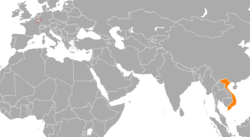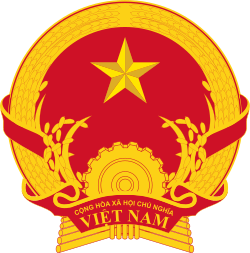Luxembourg–Vietnam relations
Luxembourg–Vietnam relations are the bilateral relations between Luxembourg and Vietnam. Both countries established diplomatic relations in 1973.[1] Luxembourg's representation in Vietnam is through its embassy in Bangkok, Thailand.[2] Vietnam is represented through its embassy in Brussels, Belgium.[3]
 | |
Luxembourg |
Vietnam |
|---|---|
Mutual international support
In December 2008, Vietnam called on Luxembourg to support its ties with European Union. For its part, Vietnam is backing Luxembourg’s candidacy for the post of non-permanent member at the UN Security Council.[4]
Trade links
Vietnam is one of the ten key countries in Luxembourg’s development cooperation program.[5] The countries have agreed to build a legal framework to facilitate business ties.[6] At a meeting between Vietnamese Prime Minister Nguyễn Tấn Dũng and his Luxembourg counterpart, Jean-Claude Juncker, in September 2006, the two Prime Ministers agreed the need to boost bilateral trade ties based on the combination of Luxembourg's advanced technology and Vietnam's intensive labour force.[7] Nguyễn Tấn Dũng, in October 2007, praised the cooperation by Luxembourg companies in finance and education and expressed the wish to boost bilateral ties with Luxembourg in these areas.[8] In December 2008, according to Vietnam National Assembly Chairman Nguyễn Phú Trọng, there was still much potential for further economic and commercial co-operation.[9]
Development Cooperation
Luxembourg pledged EUR35 million in aid for the 2002-05 period.[1] Covering the period of 2006 to 2010, the second Indicative Cooperation Programme (ICP) aligned Luxembourg’s interventions with Vietnam’s five-year Socio-Economic Development Plan and supported, with a budget of 50 million EUR, development policies and strategies to achieve the MDGs of the Vietnamese government. Under the overall objective of poverty reduction, the second ICP paid special attention to assisting the poorest provinces and most remote districts. With a budget of 42 million EUR, the third ICP (2011–2015) has a twofold approach. Poverty reduction remains the main objective, support through programmes in social sectors, namely health and local development. In addition the needs and new challenges faced by a middle income country are addressed through an increased focus on capacity building and human resource development in the banking and finance sector as well as in the vocational training sector including tourism and hospitality. With health, local development and vocational training as priority sectors and with a concentration of activities in the four provinces of Thua Thien Hue, Cao Bang, Bac Kan and Nghe An, the third ICP identifies the same priorities as the previous programme. If the current ICP is a continuity of previous interventions, it constitutes also a consolidation of Luxembourg’s support and aims at diversifying relations between the two countries. With the achievement of the status of a middle income country, enhanced international and regional integration and with continued industrialisation, the needs of Vietnam in terms of international assistance have been changing. Luxembourg adapts its development cooperation accordingly and proposes further support in the field of green growth, capacity building in the finance and banking sector as well as in the sector of medical research. As the implementation of these activities can rely on specific expertise based in Luxembourg, they constitute adequate means to a transition to stronger and diversified relations beyond development cooperation between the two countries. The third ICP also takes into consideration recent developments in the field of aid effectiveness. A stronger emphasis on cooperation with the private sector is carried out through interventions in the banking and finance sector whereas local development projects aim at close cooperation with civil society and community based organisations. The ICP also includes a variety of aid modalities such as more programme oriented approaches in the health sector, a delegated cooperation to the health sector support programme implemented by the European Commission and collaboration with UN agencies. 20% of the financial envelope of ICP III is dedicated to multilateral projects targeting the same sectors as the bilateral projects, in order to strengthen synergies and to increase their impact. The Luxembourg development cooperation contributes to the One UN Fund (2012-2016) which directly supports the implementation of the One UN Plan in Vietnam. It also works directly with five UN agencies in Vietnam: UNCTAD, UN Women, UNICEF, ILO and UNESCO. A mid-term evaluation of the current ICP, conducted in June 2014, underlined the important and visible results and impacts reached by Luxembourg’s development cooperation and its Vietnamese partners on provincial level, be it in strengthening health care in Cao Bang and Bac Kan provinces, in improving income of vulnerable groups in remote areas of Nghe An province, in providing high standard vocational training for tourism and hospitality students in Hue Tourism College and associated schools and in supporting the Vietnam States Securities Commission in creating a better environment for foreign investors. The evaluation also drew conclusions on the need to further diversify relations between the two countries.[10]
References
- "Luxembourg and Vietnam strengthen ties with US$34.7 mln grant", Asia Pulse News, 26 September 2002.
- http://bangkok.mae.lu/en
- "List of Vietnamese Embassies and Consulates abroad" Archived 2007-06-16 at Archive.today, 48th International Mathematical Olympiad, retrieved 28 April 2009.
- "Vietnam calls Luxembourg to support its ties with EU" Archived 2009-04-15 at the Wayback Machine, VOV News, 23 December 2008.
- "Grand Duke of Luxembourg to visit Vietnam" Archived 2009-04-12 at the Wayback Machine, VietNamNet Bridge, 10 February 2009.
- "Viet Nam, Luxembourg facilitate investment ties", Vietnam News Agency, 2 July 2007.
- "Vietnamese Days open in Luxembourg with business seminar" Archived 2008-06-23 at the Wayback Machine, VietNamNet Bridge, 17 September 2006.
- "Vietnam wants to boost economic and education ties" Archived 2008-10-09 at the Wayback Machine, New Europe, 20 October 2007.
- "Nation bolsters ties with Luxembourg", Vietnam News Agency, 23 December 2008.
- http://www.gouvernement.lu/4684612/vietnam
